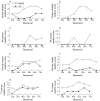Why does Japan have a high incidence of gastric cancer? Comparison of gastritis between UK and Japanese patients
- PMID: 16603635
- PMCID: PMC1860129
- DOI: 10.1136/gut.2005.080358
Why does Japan have a high incidence of gastric cancer? Comparison of gastritis between UK and Japanese patients
Abstract
Background and aims: The incidence of gastric cancer in Japan is four times higher than in the UK. It usually arises in a stomach with corpus predominant or pangastritis that has undergone extensive atrophy and intestinal metaplasia. We hypothesised that a Japanese population would have a more severe gastritis with a corpus predominant or pangastritis pattern and a greater degree of atrophy and intestinal metaplasia than that found in the UK. To test this we designed a comparative trial.
Methods: A total of 252 age matched consecutive patients were recruited from the endoscopy services in Leeds and Tokyo. In each centre, 21 patients were prospectively selected from each decennial, between the ages of 20-80 years. All had epigastric discomfort as their predominant symptom. Patients with peptic ulcer, cancer, and oesophagitis were excluded. Five gastric biopsies were examined by two histopathologists using the updated Sydney system. Helicobacter pylori infection was assessed by histology and culture of biopsies and enzyme linked immunosorbent assay and immunoblot of plasma.
Results: Gastritis was found by both pathologists in 59 (47%) UK and 76 (60%) Japanese patients (chi(2) test, p = 0.04). In those patients with gastritis, corpus predominant or pangastritis was commoner in the Japanese (63% Japan v 36% in the UK (chi(2) test, p = 0.003) Atrophy and intestinal metaplasia were more extensive and severe (Mann-Whitney U test, p<0.001) and chronic inflammation and polymorph activity were also greater, especially in the corpus (Mann-Whitney U test, p<0.001). Fifty three of 59 UK gastritis patients (90%) and 67/76 (88%) (chi(2) test, p = 1) Japanese gastritis patients were positive for H pylori. Using a previously described "gastric cancer risk index" among H pylori positive patients, there were significantly more Japanese than UK subjects with a "high risk" score.
Conclusion: In Japanese as opposed to English patients, gastritis is more prevalent and severe with more corpus predominant atrophy and intestinal metaplasia. These differences may partially explain the higher incidence of gastric cancer in Japan.
Conflict of interest statement
Conflict of interest: None declared.
Similar articles
-
Helicobacter pylori infection, glandular atrophy, intestinal metaplasia and topography of chronic active gastritis in the Nepalese and Japanese population: the age, gender and endoscopic diagnosis matched study.Kathmandu Univ Med J (KUMJ). 2007 Jul-Sep;5(3):295-301. Kathmandu Univ Med J (KUMJ). 2007. PMID: 18604043
-
Observation of gastric mucosa in Bangladesh, the country with the lowest incidence of gastric cancer, and Japan, the country with the highest incidence.Helicobacter. 2012 Oct;17(5):396-401. doi: 10.1111/j.1523-5378.2012.00967.x. Epub 2012 Jul 2. Helicobacter. 2012. PMID: 22967124 Free PMC article.
-
Gastric phenotype in children with Helicobacter pylori infection undergoing upper endoscopy.Scand J Gastroenterol. 2011 Mar;46(3):293-8. doi: 10.3109/00365521.2010.533383. Epub 2010 Nov 15. Scand J Gastroenterol. 2011. PMID: 21073375
-
Gastric atrophy, metaplasia, and dysplasia: a clinical perspective.J Clin Gastroenterol. 2003 May-Jun;36(5 Suppl):S29-36; discussion S61-2. doi: 10.1097/00004836-200305001-00006. J Clin Gastroenterol. 2003. PMID: 12702963 Review.
-
Intestinal metaplasia, atrophic gastritis and stomach cancer: trends over time.Eur J Gastroenterol Hepatol. 1994 Dec;6 Suppl 1:S79-83. Eur J Gastroenterol Hepatol. 1994. PMID: 7735941 Review.
Cited by
-
Surveillance for gastrointestinal malignancies.World J Gastroenterol. 2012 Sep 7;18(33):4507-16. doi: 10.3748/wjg.v18.i33.4507. World J Gastroenterol. 2012. PMID: 22969223 Free PMC article. Review.
-
Aberrant methylation of microRNA-34b/c is a predictive marker of metachronous gastric cancer risk.J Gastroenterol. 2014 Jul;49(7):1135-44. doi: 10.1007/s00535-013-0861-7. Epub 2013 Aug 13. J Gastroenterol. 2014. PMID: 23942619 Free PMC article.
-
Pepsinogen Serology and Gastritis OLGA Staging in Mucosal Atrophy Assessment: A Cross-Sectional Study Involving East China Endoscopy Population.Gastroenterol Res Pract. 2020 Apr 13;2020:2324505. doi: 10.1155/2020/2324505. eCollection 2020. Gastroenterol Res Pract. 2020. PMID: 32351553 Free PMC article.
-
Role of Helicobacter pylori and Other Environmental Factors in the Development of Gastric Dysbiosis.Pathogens. 2021 Sep 16;10(9):1203. doi: 10.3390/pathogens10091203. Pathogens. 2021. PMID: 34578235 Free PMC article. Review.
-
Increased risk of non-AIDS-defining cancers in Asian HIV-infected patients: a long-term cohort study.BMC Cancer. 2018 Nov 6;18(1):1066. doi: 10.1186/s12885-018-4963-8. BMC Cancer. 2018. PMID: 30400779 Free PMC article.
References
Publication types
MeSH terms
LinkOut - more resources
Full Text Sources
Other Literature Sources
Medical





